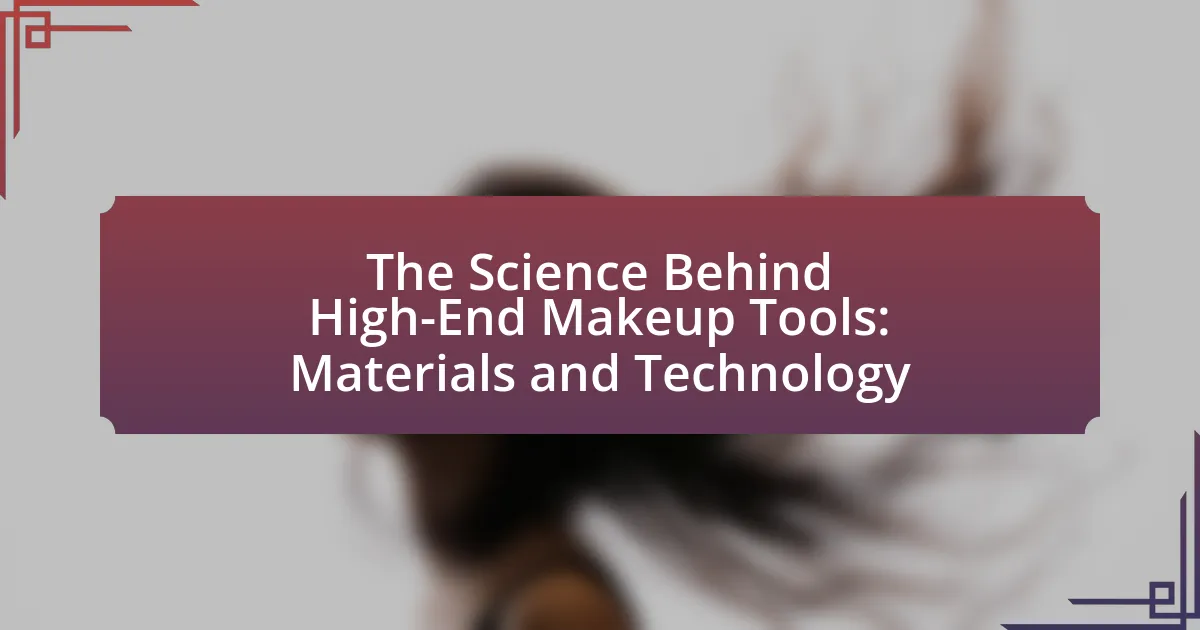The article focuses on the best makeup brushes for achieving a flawless finish, highlighting top products such as the Sigma F80 Flat Kabuki Brush, Real Techniques Expert Face Brush, and MAC 217 Blending Brush. It explains how different brush types contribute to effective makeup application, discusses essential brushes for beginners, and examines the impact of brush materials on performance. Additionally, the article emphasizes the importance of brush quality, maintenance practices, and how to select the right brushes based on individual makeup styles and needs. It also addresses common mistakes to avoid when choosing makeup brushes, ensuring readers are well-informed for optimal makeup application.

What are the Best Makeup Brushes for Achieving a Flawless Finish?
The best makeup brushes for achieving a flawless finish include the Sigma F80 Flat Kabuki Brush, the Real Techniques Expert Face Brush, and the MAC 217 Blending Brush. The Sigma F80 is renowned for its dense bristles that provide even foundation application, while the Real Techniques Expert Face Brush is praised for its versatility and ability to blend seamlessly. The MAC 217 is a favorite for eyeshadow blending, allowing for a smooth transition of colors. These brushes are favored by makeup artists and enthusiasts alike for their quality and effectiveness in creating a polished look.
How do different types of makeup brushes contribute to a flawless finish?
Different types of makeup brushes contribute to a flawless finish by providing specific applications and blending techniques suited for various products. For instance, foundation brushes, such as flat or buffing brushes, allow for even distribution of liquid or cream foundations, minimizing streaks and enhancing coverage. Similarly, tapered brushes are ideal for applying powder products, as they can reach into contours and provide a soft, diffused look. Additionally, eyeshadow brushes, like blending and packing brushes, enable precise application and seamless blending of colors, which is essential for creating depth and dimension on the eyelids. The right brush type ensures that products adhere properly to the skin, enhancing the overall finish and longevity of the makeup.
What are the essential types of makeup brushes for beginners?
The essential types of makeup brushes for beginners include a foundation brush, a concealer brush, a powder brush, a blush brush, an eyeshadow brush, and an eyeliner brush. Each of these brushes serves a specific purpose that aids in achieving a flawless makeup application. For instance, a foundation brush helps in evenly applying liquid or cream foundation, while a concealer brush is designed for precise application of concealer to cover blemishes or dark circles. A powder brush is used to set makeup with loose or pressed powder, and a blush brush applies blush to the cheeks for a natural flush. An eyeshadow brush is essential for applying and blending eyeshadow on the eyelids, and an eyeliner brush allows for precise application of gel or cream eyeliner. These brushes are fundamental for beginners to create a well-rounded makeup kit and ensure effective application techniques.
How does brush material affect makeup application?
Brush material significantly affects makeup application by influencing the texture, finish, and blending capabilities of the product. Synthetic brushes, made from nylon or polyester, are ideal for liquid and cream products as they provide a smooth application and are easier to clean, preventing bacteria buildup. In contrast, natural hair brushes, crafted from animal fur, excel in applying powder products due to their ability to pick up and distribute pigments evenly, resulting in a more airbrushed finish. Research indicates that the choice of brush material can alter the way makeup adheres to the skin, impacting longevity and overall appearance. For example, a study published in the Journal of Cosmetic Dermatology highlights that natural bristles can create a softer, more diffused look, while synthetic fibers can deliver a more precise application.
Why is the quality of makeup brushes important?
The quality of makeup brushes is important because high-quality brushes ensure better application and blending of makeup products. Quality brushes are made with superior materials that prevent shedding and provide a smoother finish, which enhances the overall look. For instance, synthetic fibers in high-quality brushes can effectively apply liquid and cream products without absorbing them, leading to less waste and a more polished appearance. Additionally, brushes with well-constructed handles offer better control and precision, allowing for more accurate makeup application.
What features should you look for in high-quality makeup brushes?
High-quality makeup brushes should have soft, synthetic or natural bristles, a sturdy handle, and a well-constructed ferrule. Soft bristles ensure a smooth application and blend seamlessly, while synthetic options are often more hygienic and easier to clean. A sturdy handle provides better control during application, and a well-constructed ferrule prevents shedding of bristles, ensuring longevity. These features contribute to achieving a flawless finish, as supported by industry professionals who emphasize the importance of quality tools in makeup application.
How can the right brush improve makeup longevity?
The right brush can significantly improve makeup longevity by ensuring even application and better product adherence to the skin. Brushes designed for specific products, such as foundation or eyeshadow, help distribute the makeup evenly, preventing patchiness and enhancing wear time. For instance, synthetic brushes are ideal for liquid products as they minimize absorption and allow for a smooth finish, while natural bristles work well with powders, providing a soft blend. Studies have shown that proper application techniques using the right tools can extend the lifespan of makeup by reducing the need for touch-ups throughout the day.
What are the top brands known for their makeup brushes?
The top brands known for their makeup brushes include Sigma Beauty, MAC Cosmetics, Real Techniques, Morphe, and Bobbi Brown. Sigma Beauty is renowned for its high-quality synthetic brushes that are designed for professional use, while MAC Cosmetics offers a wide range of brushes favored by makeup artists globally. Real Techniques is popular for its affordable yet effective brushes, making them accessible to everyday users. Morphe is recognized for its extensive collection and collaborations with influencers, appealing to a younger demographic. Bobbi Brown is celebrated for its luxurious brushes that enhance the application of their makeup products. These brands are consistently highlighted in beauty reviews and industry awards for their performance and quality.
What makes each brand unique in terms of brush design and functionality?
Each brand offers distinct features in brush design and functionality that set them apart. For instance, Brand A is known for its ergonomic handles that enhance grip and control, allowing for precise application. Brand B utilizes synthetic bristles that mimic natural hair, providing a soft touch while ensuring cruelty-free practices. Brand C focuses on multi-functional brushes, designed to serve various purposes, such as contouring and blending, which maximizes versatility for users. Brand D incorporates innovative technology, such as antibacterial bristles, which promote hygiene and longevity. These unique attributes contribute to the overall effectiveness and user experience of each brand’s makeup brushes.
How do customer reviews influence the choice of makeup brushes?
Customer reviews significantly influence the choice of makeup brushes by providing firsthand insights into product performance and user satisfaction. Potential buyers often rely on these reviews to gauge the quality, durability, and effectiveness of brushes, as they reflect real experiences from other consumers. Research indicates that 79% of consumers trust online reviews as much as personal recommendations, highlighting their impact on purchasing decisions. Positive reviews can enhance a product’s credibility, while negative feedback can deter potential buyers, ultimately shaping market trends and consumer preferences in the makeup brush industry.
How can you maintain and care for your makeup brushes?
To maintain and care for your makeup brushes, regularly clean them with a gentle soap or brush cleaner to remove makeup residue and bacteria. Cleaning brushes at least once a week helps prevent product buildup and prolongs their lifespan. Additionally, reshape the bristles after washing and lay them flat to dry, as drying them upright can cause water to seep into the ferrule, loosening the glue. Regular maintenance not only ensures optimal performance but also promotes skin health by reducing the risk of breakouts caused by dirty brushes.
What are the best practices for cleaning makeup brushes?
The best practices for cleaning makeup brushes include using a gentle cleanser, rinsing thoroughly, and allowing brushes to air dry. To clean brushes effectively, first, wet the bristles with lukewarm water, then apply a small amount of gentle soap or brush cleaner to the bristles. Gently swirl the brush in the palm of your hand or on a clean surface to remove makeup residue. Rinse the bristles under running water until the water runs clear, ensuring no soap remains. Finally, reshape the bristles and lay the brushes flat on a clean towel to dry, preventing water from seeping into the ferrule, which can damage the brush. Regular cleaning, ideally once a week, helps maintain hygiene and prolongs the life of the brushes.
How often should you replace your makeup brushes for optimal performance?
You should replace your makeup brushes every three to six months for optimal performance. Regular replacement ensures that the brushes maintain their effectiveness in applying makeup and minimize the risk of bacterial buildup, which can lead to skin issues. Studies indicate that makeup brushes can harbor bacteria, and using old brushes can compromise the quality of makeup application and skin health.
What tips can help you choose the right makeup brushes for your needs?
To choose the right makeup brushes for your needs, consider the type of makeup you use and the specific application techniques required. Different brushes serve distinct purposes; for example, a flat foundation brush is ideal for liquid foundations, while a fluffy brush is better for powder products. Additionally, assess the brush material; synthetic fibers are suitable for cream products, while natural bristles work well with powders. The size and shape of the brush should also match the area of application, such as a small brush for precise eyeliner or a larger brush for blending. Research indicates that using the appropriate brush can enhance makeup application and longevity, making it essential to select brushes that align with your makeup routine.
How can you determine which brushes are best for your makeup style?
To determine which brushes are best for your makeup style, assess your specific makeup techniques and desired finishes. Different brushes serve distinct purposes; for example, a flat foundation brush is ideal for applying liquid foundation, while a fluffy blending brush is essential for seamless eyeshadow application. Additionally, consider the brush material; synthetic fibers work well with cream products, while natural bristles are better for powders. Research indicates that using the right brush can enhance makeup application and longevity, as noted in studies by makeup artists and beauty experts.
What common mistakes should you avoid when selecting makeup brushes?
When selecting makeup brushes, avoid common mistakes such as choosing the wrong brush type for specific applications, neglecting brush quality, and failing to consider brush size and shape. Using the incorrect brush type can lead to uneven application; for example, a flat brush is ideal for foundation, while a fluffy brush is better for blending. Prioritizing quality is essential, as low-quality brushes can shed bristles and affect makeup performance; studies show that high-quality brushes can enhance makeup longevity and finish. Additionally, selecting the wrong size or shape can hinder precision; for instance, a small brush is necessary for detailed work like eyeliner, while larger brushes are suited for broader areas like the cheeks.





